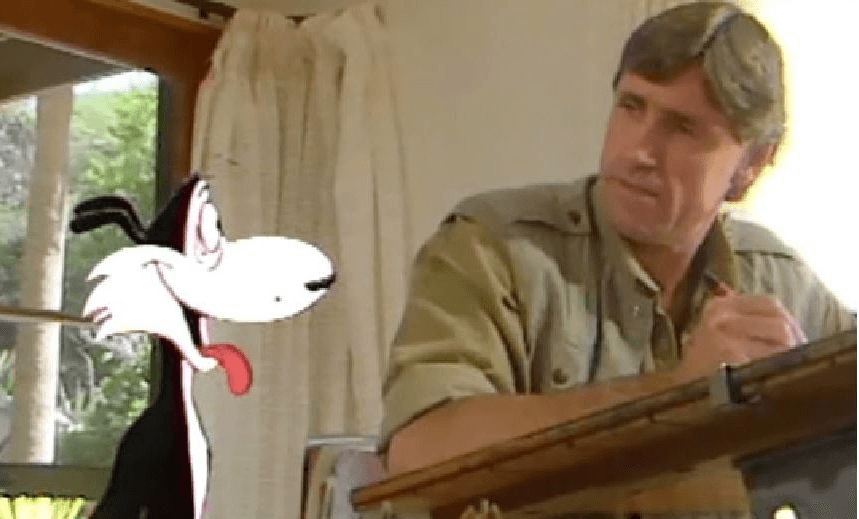The beloved creator of Wal and Dog, who has died at the age of 78, also served up a feminist-bashing tract. But it is possible to deplore that book while celebrating the awe and joy of the rest of his work, writes comics artist Indira Neville.
One night at the pub a friend compared me to Pongo Footrot, Wal’s niece. I do not know what was in my friend’s head when she told me this. I was way too excited and a little bit too drunk to ask. Instead I just squealed and jumped up and down because it was so overwhelming.
I was overwhelmed because I think Pongo is amazing. Pongo (her real name is Janice but no one ever calls her that) spends her school holidays at her uncle’s farm where she is tough and fearless, traipsing around the paddocks like she owns them. She has muddy physical outdoor adventures; is not afraid to hug or wrestle or ride the animals; does not worry about being liked or pleasing others; makes her own choices; and knows how to say what she thinks, in a real big voice, to adults even. But Pongo is also well-rounded and lovely and girly. She sometimes wears a frock, cares about her dolls, and likes having tea parties with Dog in his old water tank doghouse.
Pongo makes the most of her life, and in doing so I think she somehow cracks a classic feminist dilemma. She has figured out how to successfully gain access to the stuff women have generally been denied (like chainsaws and confidence) while simultaneously valuing what women have become as a result of that very denial (like pigtails and nurturing). There is an image of Pongo happily and furiously skipping rope (traditionally feminine) in her gumboots (traditionally masculine) that for me captures this idea completely. She is a wonderfully unabashed integrated gender-fluid whole.
Pongo is one of my most favourite comic characters of all time and I will be forever impressed that Murray Ball, a middle-aged man, could create such a complex, powerful and inspiring, bold and nuanced young female. There is a bunch of other stuff about Murray Ball’s work that I love, his lively singular drawing; how his comics are hilarious, short and sharp, emphasising moments and jokes and the interplay of image and text; and that I could talk about them with my dad (who, incidentally, played Wal to great acclaim in the Whakatane Repertory Theatre’s production of Footrot Flats in the mid-80s).
There is one Murray Ball project, though, that upsets and perplexes me and the existence of Pongo and the other good stuff just listed only makes it feel worse. Published in 1993, The Sisterhood is simply a really shitty book. The content is awful, made up of vicious obvious unfunny jokes about fat hairy lesbian feminist killjoys. The drawing is awful, too, laboured and derivative, what my friend Chris calls Ball’s “dreadful Ronald Searle meets Robert Crumb phase”. The book is indefensible and I will be forever sad and grossed out that Murray Ball made it.
The existence of The Sisterhood makes Murray Ball problematic for me, and based on recent raging social media debates I do not think I am the only one for whom this is true. But the existence of The Sisterhood does not cancel out Murray Ball’s generally superior comic-making chops, nor his substantial oeuvre, its cultural significance, and all the times the works within it made people laugh. Neither for me does it cancel out Pongo and the awe and joy she makes me feel.
I have figured out how to live with the ambiguity of Murray Ball, and on balance think he brought the world more joy than pain. I am truly sad that he has died.
And to this day the comparison with Pongo remains the greatest compliment I have ever received.
The Society section is sponsored by AUT. As a contemporary university we’re focused on providing exceptional learning experiences, developing impactful research and forging strong industry partnerships. Start your university journey with us today.



